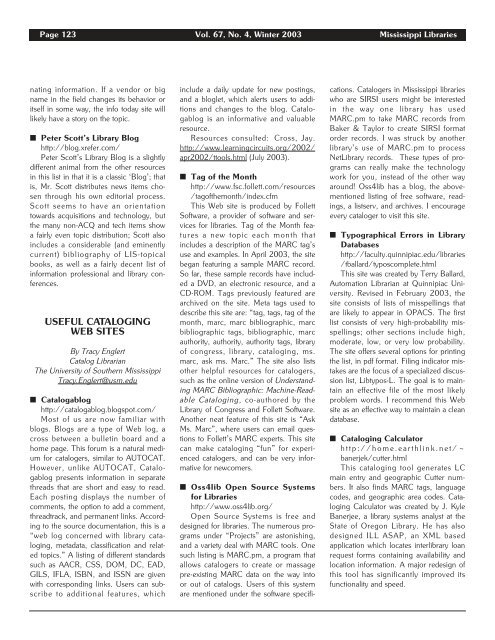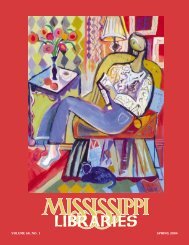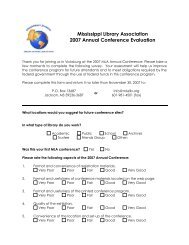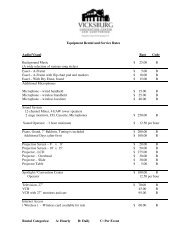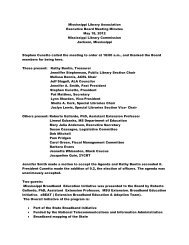Full Text (PDF) - Mississippi Library Association
Full Text (PDF) - Mississippi Library Association
Full Text (PDF) - Mississippi Library Association
Create successful ePaper yourself
Turn your PDF publications into a flip-book with our unique Google optimized e-Paper software.
Page 123 Vol. 67, No. 4, Winter 2003 <strong>Mississippi</strong> Libraries<br />
nating information. If a vendor or big<br />
name in the field changes its behavior or<br />
itself in some way, the info today site will<br />
likely have a story on the topic.<br />
■ Peter Scott’s <strong>Library</strong> Blog<br />
http://blog.xrefer.com/<br />
Peter Scott’s <strong>Library</strong> Blog is a slightly<br />
different animal from the other resources<br />
in this list in that it is a classic ‘Blog’; that<br />
is, Mr. Scott distributes news items chosen<br />
through his own editorial process.<br />
Scott seems to have an orientation<br />
towards acquisitions and technology, but<br />
the many non-ACQ and tech items show<br />
a fairly even topic distribution; Scott also<br />
includes a considerable (and eminently<br />
current) bibliography of LIS-topical<br />
books, as well as a fairly decent list of<br />
information professional and library conferences.<br />
USEFUL CATALOGING<br />
WEB SITES<br />
By Tracy Englert<br />
Catalog Librarian<br />
The University of Southern <strong>Mississippi</strong><br />
Tracy.Englert@usm.edu<br />
■ Catalogablog<br />
http://catalogablog.blogspot.com/<br />
Most of us are now familiar with<br />
blogs. Blogs are a type of Web log, a<br />
cross between a bulletin board and a<br />
home page. This forum is a natural medium<br />
for catalogers, similar to AUTOCAT.<br />
However, unlike AUTOCAT, Catalogablog<br />
presents information in separate<br />
threads that are short and easy to read.<br />
Each posting displays the number of<br />
comments, the option to add a comment,<br />
threadtrack, and permanent links. According<br />
to the source documentation, this is a<br />
“web log concerned with library cataloging,<br />
metadata, classification and related<br />
topics.” A listing of different standards<br />
such as AACR, CSS, DOM, DC, EAD,<br />
GILS, IFLA, ISBN, and ISSN are given<br />
with corresponding links. Users can subscribe<br />
to additional features, which<br />
include a daily update for new postings,<br />
and a bloglet, which alerts users to additions<br />
and changes to the blog. Catalogablog<br />
is an informative and valuable<br />
resource.<br />
Resources consulted: Cross, Jay.<br />
http://www.learningcircuits.org/2002/<br />
apr2002/ttools.html (July 2003).<br />
■ Tag of the Month<br />
http://www.fsc.follett.com/resources<br />
/tagofthemonth/index.cfm<br />
This Web site is produced by Follett<br />
Software, a provider of software and services<br />
for libraries. Tag of the Month features<br />
a new topic each month that<br />
includes a description of the MARC tag’s<br />
use and examples. In April 2003, the site<br />
began featuring a sample MARC record.<br />
So far, these sample records have included<br />
a DVD, an electronic resource, and a<br />
CD-ROM. Tags previously featured are<br />
archived on the site. Meta tags used to<br />
describe this site are: “tag, tags, tag of the<br />
month, marc, marc bibliographic, marc<br />
bibliographic tags, bibliographic, marc<br />
authority, authority, authority tags, library<br />
of congress, library, cataloging, ms.<br />
marc, ask ms. Marc.” The site also lists<br />
other helpful resources for catalogers,<br />
such as the online version of Understanding<br />
MARC Bibliographic: Machine-Readable<br />
Cataloging, co-authored by the<br />
<strong>Library</strong> of Congress and Follett Software.<br />
Another neat feature of this site is “Ask<br />
Ms. Marc”, where users can email questions<br />
to Follett’s MARC experts. This site<br />
can make cataloging “fun” for experienced<br />
catalogers, and can be very informative<br />
for newcomers.<br />
■ Oss4lib Open Source Systems<br />
for Libraries<br />
http://www.oss4lib.org/<br />
Open Source Systems is free and<br />
designed for libraries. The numerous programs<br />
under “Projects” are astonishing,<br />
and a variety deal with MARC tools. One<br />
such listing is MARC.pm, a program that<br />
allows catalogers to create or massage<br />
pre-existing MARC data on the way into<br />
or out of catalogs. Users of this system<br />
are mentioned under the software specifications.<br />
Catalogers in <strong>Mississippi</strong> libraries<br />
who are SIRSI users might be interested<br />
in the way one library has used<br />
MARC.pm to take MARC records from<br />
Baker & Taylor to create SIRSI format<br />
order records. I was struck by another<br />
library’s use of MARC.pm to process<br />
Net<strong>Library</strong> records. These types of programs<br />
can really make the technology<br />
work for you, instead of the other way<br />
around! Oss4lib has a blog, the abovementioned<br />
listing of free software, readings,<br />
a listserv, and archives. I encourage<br />
every cataloger to visit this site.<br />
■ Typographical Errors in <strong>Library</strong><br />
Databases<br />
http://faculty.quinnipiac.edu/libraries<br />
/tballard/typoscomplete.html<br />
This site was created by Terry Ballard,<br />
Automation Librarian at Quinnipiac University.<br />
Revised in February 2003, the<br />
site consists of lists of misspellings that<br />
are likely to appear in OPACS. The first<br />
list consists of very high-probability misspellings;<br />
other sections include high,<br />
moderate, low, or very low probability.<br />
The site offers several options for printing<br />
the list, in pdf format. Filing indicator mistakes<br />
are the focus of a specialized discussion<br />
list, Libtypos-L. The goal is to maintain<br />
an effective file of the most likely<br />
problem words. I recommend this Web<br />
site as an effective way to maintain a clean<br />
database.<br />
■ Cataloging Calculator<br />
http://home.earthlink.net/~<br />
banerjek/cutter.html<br />
This cataloging tool generates LC<br />
main entry and geographic Cutter numbers.<br />
It also finds MARC tags, language<br />
codes, and geographic area codes. Cataloging<br />
Calculator was created by J. Kyle<br />
Banerjee, a library systems analyst at the<br />
State of Oregon <strong>Library</strong>. He has also<br />
designed ILL ASAP, an XML based<br />
application which locates interlibrary loan<br />
request forms containing availability and<br />
location information. A major redesign of<br />
this tool has significantly improved its<br />
functionality and speed.


